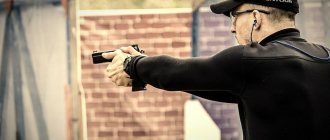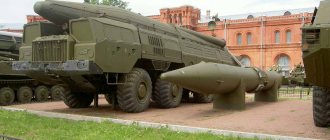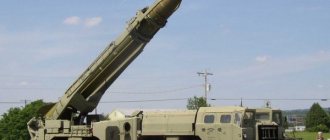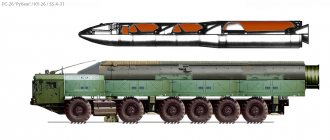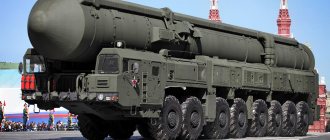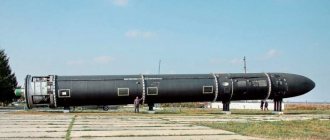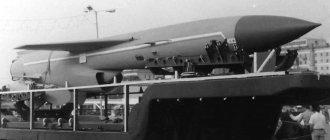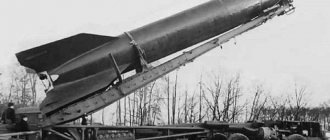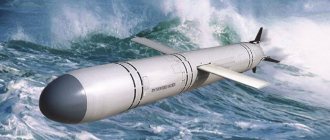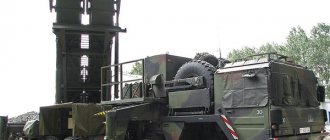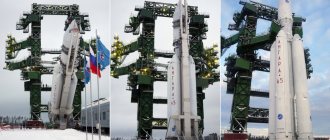| "Temp-S" | |
| GRAU index: 9K76 according to the INF Treaty: OTR-22 according to NATO classification: SS-12/SS-22 Scaleboard | |
| Launcher 9P120 of the Soviet OTRK "Temp-S" | |
| Type | OTRK |
| Status | liquidated under the INF Treaty |
| Developer | MIT |
| Chief designer | A. D. Nadiradze |
| Years of development | Since 1962[1] |
| Start of testing | March 14, 1965 - October 7, 1965 (29 launches)[2] |
| Adoption | December 29, 1965[3] |
| Manufacturer | 9M76: Votkinsk |
| Years of production | 1966[4]-1987 [5] |
| Units produced | 9M76: >1200[4] |
| Years of use | 1966-1990[4] |
| Main operators | Strategic Missile Forces Strategic Missile Forces |
| Basic model | 9K71 "Temp" |
| Main technical characteristics | |
| Range: 900 km Firing accuracy (CA): 0.37 km Type of warhead: Monoblock, nuclear 1×0.5 | |
| ↓All technical specifications | |
| Media files on Wikimedia Commons | |
Temp-S
(GRAU Index -
9K76
, according to the INF Treaty -
OTR-22
, according to NATO classification -
SS-12 / SS-22 Scaleboard
) - a Soviet mobile operational-tactical missile system of front-line subordination, equipped with a two-stage solid-fuel ballistic missile
9M76
with a detachable nuclear head part.
The main task assigned to Temp-S was to provide front command with the ability to launch nuclear strikes in the appropriate theater of military operations. The MAZ-543 tractor, similar to that used in the 9K72 Elbrus rocket launcher (the so-called Scud), was used as a chassis on the launcher
), but the missile located on the launcher was hidden in a special container that opens along the longitudinal axis of the launcher after verticalization of the missile before launch. To control the rocket in the active part of the trajectory, deflectors on the nozzles were used. The control system uses a gyro-stabilized platform with pitch, yaw and rotation gyro units.
Over the entire period of operation of the Republic of Kazakhstan, 427 launches were carried out, and only 3 launches were emergency[4].
In service[ | ]
"Temp-S" was in service only with the Armed Forces of the USSR:
- Strategic Missile Forces of the USSR Armed Forces - in connection with the deterioration of relations between the USSR and China in 1967, a number of missile regiments of the Strategic Missile Forces (mainly included in missile divisions located along the border with the People's Republic of China) were rearmed with the Temp-S missile system, and subsequently these regiments were transferred from the Strategic Missile Forces to the corresponding military districts (groups of forces). 115th Missile Regiment
, stationed in the village.
Paplaka of the Latvian SSR, part of the 29th Missile Division, received the Temp-S in 1965-1966 to replace the first Soviet MRBM R-5M. Retraining of the regiment for the new complex was carried out at the 4th Main Center of the Moscow Region (Kapustin Yar), while the regiment's crews carried out 13 test launches of 9M76B missiles. In June 1966, the first 115 rp
was involved in conducting demonstration launches at the NIIP-5 test site (Baikonur) for French President Charles de Gaulle (Operation Palma).
The launch took place on June 25, 1966. In 1967, the first missile division of the regiment was sent to the Chita region, where, during the period of complications in relations between the USSR and China, it carried out patrols along the Soviet-Chinese border, demonstrating the seriousness of the intentions of the Soviet Armed Forces. Subsequently, this division of 115 rp
was transferred to the Ground Forces, and from the personnel remaining in Paplaka, after the regiment handed over the Temp-S missile system to the arsenal, a regiment was formed according to the staff of the regiment, armed with the UR-100 (8K84) ICBM. which was then transferred to Pervomaisk (Ukrainian SSR); - 69th Missile Regiment
- after transfer to the Ground Forces, it became
the 124th Missile Brigade
of the Russian Military Army. - 101st Missile Regiment
(military unit 86343) - from 195?
until 1965 - 8 R-5M launchers (Svalyava, Transcarpathian region, from 1965 - Mukachevo), removed from the database in 1965, on May 30, 1967 transferred to Sary-Ozek (Kazakh SSR) where it was rearmed with the Temp-S missile system. In 1968 it was transferred to the Army, and in 1969 it was renamed the 126th Missile Brigade
[6]. - 84th Missile Regiment
(military unit 82717), from 1958 to 1965 - 8 R-5M launchers (Perevalnoe village in Crimea), removed from the database in 1965, in 1967 transferred to Emilchino (Ukrainian SSR), where it was rearmed at RK "Temp-S".
In 1969, transferred to the Army and renamed into the 844th separate missile division
[7] stationed in the Crimea, Belogorsk.
Excerpt characterizing Temp-S
“Everyone, gentlemen,” (every word was heard by Rostov like a sound from heaven), I thank you with all my heart. How happy Rostov would be if he could now die for his Tsar! – You have earned the banners of St. George and you will deserve them. “Just die, die for him!” thought Rostov. The Emperor also said something that Rostov did not hear, and the soldiers, pushing their breasts, shouted: Hurra! Rostov also screamed, bending down to the saddle as much as he could, wanting to hurt himself with this cry, only to fully express his admiration for the sovereign. The Emperor stood for several seconds against the hussars, as if he was undecided. “How could the sovereign be indecisive?” thought Rostov, and then even this indecision seemed to Rostov majestic and charming, like everything that the sovereign did. The sovereign's indecisiveness lasted for an instant. The sovereign's foot, with a narrow, sharp toe of a boot, as was worn at that time, touched the groin of the anglicized bay mare on which he was riding; the sovereign's hand in a white glove picked up the reins, he set off, accompanied by a randomly swaying sea of adjutants. He rode further and further, stopping at other regiments, and, finally, only his white plume was visible to Rostov from behind the retinue surrounding the emperors. Among the gentlemen of the retinue, Rostov noticed Bolkonsky, sitting lazily and dissolutely on a horse. Rostov remembered his yesterday's quarrel with him and the question presented itself whether he should or should not be summoned. “Of course, it shouldn’t,” Rostov now thought... “And is it worth thinking and talking about this at a moment like now? In a moment of such a feeling of love, delight and selflessness, what do all our quarrels and insults mean!? I love everyone, I forgive everyone now,” thought Rostov. When the sovereign had visited almost all the regiments, the troops began to pass by him in a ceremonial march, and Rostov rode in the Bedouin newly purchased from Denisov in the castle of his squadron, that is, alone and completely in sight of the sovereign. Before reaching the sovereign, Rostov, an excellent rider, spurred his Bedouin twice and brought him happily to that frantic trot gait with which the heated Bedouin walked. Bending his foaming muzzle to his chest, separating his tail and as if flying in the air and not touching the ground, gracefully and high throwing up and changing his legs, the Bedouin, who also felt the sovereign’s gaze on him, walked excellently. Rostov himself, with his legs thrown back and his stomach tucked up and feeling like one piece with the horse, with a frowning but blissful face, the devil, as Denisov said, rode past the sovereign. - Well done Pavlograd residents! - said the sovereign. "My God! How happy I would be if he told me to throw myself into the fire now,” thought Rostov. When the review was over, the officers, the newly arrived ones and the Kutuzovskys, began to gather in groups and began talking about awards, about the Austrians and their uniforms, about their front, about Bonaparte and how bad it would be for him now, especially when the Essen corps would approach, and Prussia will take our side. But most of all, in all circles they talked about Emperor Alexander, conveyed his every word, movement and admired him. Everyone wanted only one thing: under the leadership of the sovereign, to quickly march against the enemy. Under the command of the sovereign himself, it was impossible not to defeat anyone, Rostov and most of the officers thought so after the review. After the review, everyone was more confident of victory than they could have been after two won battles. The next day after the review, Boris, dressed in his best uniform and encouraged by wishes of success from his comrade Berg, went to Olmutz to see Bolkonsky, wanting to take advantage of his kindness and arrange for himself the best position, especially the position of adjutant to an important person, which seemed especially tempting to him in the army . “It’s good for Rostov, to whom his father sends 10 thousand, to talk about how he doesn’t want to bow to anyone and won’t become a lackey to anyone; but I, who have nothing but my head, need to make my career and not miss opportunities, but take advantage of them.” He did not find Prince Andrei in Olmutz that day. But the sight of Olmütz, where the main apartment stood, the diplomatic corps and both emperors lived with their retinues - courtiers, entourage, only further strengthened his desire to belong to this supreme world. He knew no one, and, despite his smart guards uniform, all these high-ranking people, scurrying through the streets, in smart carriages, plumes, ribbons and orders, courtiers and military men, seemed to stand so immeasurably above him, a guards officer, that he did not They just didn’t want to, but also couldn’t acknowledge its existence. In the premises of Commander-in-Chief Kutuzov, where he asked Bolkonsky, all these adjutants and even orderlies looked at him as if they wanted to convince him that there were a lot of officers like him hanging around here and that they were all very tired of them. Despite this, or rather as a result of this, the next day, the 15th, after lunch he again went to Olmutz and, entering the house occupied by Kutuzov, asked Bolkonsky. Prince Andrei was at home, and Boris was led into a large hall, in which, probably, they had danced before, but now there were five beds, assorted furniture: a table, chairs and a clavichord. One adjutant, closer to the door, in a Persian robe, sat at the table and wrote. The other, red, fat Nesvitsky, lay on the bed, with his hands under his head, laughing with the officer who sat down next to him. The third played the Viennese waltz on the clavichord, the fourth lay on the clavichord and sang along with him. Bolkonsky was not there. None of these gentlemen, having noticed Boris, changed their position. The one who wrote, and to whom Boris addressed, turned around in annoyance and told him that Bolkonsky was on duty, and that he should go left through the door, into the reception room, if he needed to see him. Boris thanked him and went to the reception area. There were about ten officers and generals in the reception room. While Boris came up, Prince Andrei, narrowing his eyes contemptuously (with that special look of polite weariness that clearly says that if it weren’t for my duty, I wouldn’t talk to you for a minute), listened to the old Russian general in orders, who, almost on tiptoe, at attention, with a soldier's obsequious expression on his purple face, reported something to Prince Andrei. “Very good, if you please wait,” he said to the general in that French accent in Russian, which he used when he wanted to speak contemptuously, and, noticing Boris, no longer addressing the general (who ran after him pleadingly, asking him to listen to something else) , Prince Andrey with a cheerful smile, nodding to him, turned to Boris. Boris at that moment already clearly understood what he had foreseen before, namely, that in the army, in addition to the subordination and discipline that was written in the regulations, and which was known in the regiment, and he knew, there was another, more significant subordination, the one that forced this drawn-out, purple-faced general to respectfully wait, while the captain, Prince Andrei, for his own pleasure, found it more convenient to talk with ensign Drubetsky. More than ever, Boris decided to serve henceforth not according to what is written in the charter, but according to this unwritten subordination. He now felt that only due to the fact that he had been recommended to Prince Andrei, he had already become immediately superior to the general, who in other cases, at the front, could destroy him, the guards ensign. Prince Andrei came up to him and took his hand.
Notes[ | ]
- On the strategic direction, 2006, p. 77.
- On the strategic direction, 2006, p. 79.
- On the strategic direction, 2006, p. 80.
- ↑ 1234
On the strategic direction, 2006, p. 82. - Complex 9K76 Temp-S, missile 9M76 - SS-12 / SS-22 SCALEBOARD | MilitaryRussia.Ru - domestic military equipment (after 1945)
- 101st Missile Regiment (English). Soviet Armed Forces 1945-1991
. Retrieved January 28, 2013. Archived February 2, 2013. - 84th Missile Regiment (English). Soviet Armed Forces 1945-1991
. Retrieved January 28, 2013. Archived February 2, 2013.
Links
Russian language links
ICBM R-7 • R-7A • R-16 • R-9A • UR-100 • R-36 • RT-2 • RT-20 • Temp-2S • UR-100K • R-36M • UR-100N • MR UR-100 • R-36M UTTH • RT-2PM "Topol" • R-36M2 "Voevoda" • RT-23 • RT-23 UTTH " Well done" •
Spear-R
•
Courier
• RT-2PM2 "Topol-M" • RS-24 "Yars" • RS-26 "Rubezh" • RS-28 "Sarmat"IRBM R-3 • R-5 • R-12 • R-14 • RT-1 •
RT-15
• RSD-10 •
Speedand OTRK R-1 • R-2 • R-11 • R-17 • R-18 •
9K71 "Temp"
• 9K76 "
Temp-S " • 9K79 "Tochka" • 9K714 "Oka" • 9K720 "Iskander"Uncontrolled TR 2K1 "Mars" • 2K4 "Filin" • 2K5 "Korshun" • 2K6 "Luna" • 9K52 "Luna-M" SLBM R-11FM • R-13 • R-15 • R-21 • R-27 • R-29 • R-29R •
R-31
• R-39 •
R-39UTTKh “Bark”
• R-29RM • R-29RMU2 “Sineva” • R-29RMU2.1 “Liner” » • R-30 “Bulava”The sort order is by development time. Italic experimental or not accepted for service samples are highlighted.
Literature[ | ]
- Hogg, Ian.
Twentieth-Century Artillery. - Friedman/Fairfax Publishers, 2000. - ISBN 1-58663-299-X. - 29th Guards Rocket Vitebsk Order of Lenin Red Banner Division / comp. V. A. Gurov, G. F. Dubrovin, V. I. Esin, V. P. Kozlov, E. I. Password. V. A. Rylov; under general ed. Candidate of Military Sciences, Professor, Academician of the Academy of Military Sciences of the Russian Federation, Corresponding Member of the Russian Academy of Missile and Artillery Sciences, Honored Worker of Higher Education of the Russian Federation, retired Colonel N. K. Monakhov. - Moscow: TsIPK Strategic Missile Forces, 2008. - 236 p.
- On the strategic direction. Federal State Unitary Enterprise "Moscow Institute of Heat Engineering" - 60 years old / under general. ed. Yu. S. Solomonova. - M.: Intervestnik, 2006. - 174 p. — ISBN 5-9900745-1-4.
Links[ | ]
Russian language links[ | ]
- Operational-tactical missile system 9K76 "Temp-S" (Russian). Information system "Rocketry" BSTU. Access date: May 19, 2010. Archived April 26, 2012.
- Operational tactical missile system "Temp-S" 9K76 SS-12 "Scaleboard", SS-12M "Scaleboard-B" (Russian). website “Kapustin Yar. History, technology, people." Access date: May 19, 2010.
- 9K71 Temp - SS-12 SCALEBOARD (Russian). Military.Tomsk.ru Domestic military equipment (after 1945) (2009). Access date: May 19, 2010. Archived April 26, 2012.
- 9K76 Temp-S - SS-12 / SS-22 SCALEBOARD (Russian). Military.Tomsk.ru Domestic military equipment (after 1945) (2009). Access date: May 19, 2010. Archived April 26, 2012.
